- Home
- Stephanie Laurens
The Perfect Lover Page 3
The Perfect Lover Read online
Page 3
Alfreda Archer was effusive; Portia sensed Simon’s shields snap into place even from across the room. Mrs. Archer bore all the hallmarks of a matchmaking mama, one keen to use marriage to climb the social ladder. In contrast, Winifred was calm, greeting Simon with a gentle smile and open courtesy, nothing more.
Drusilla barely managed that. She was nearly the same age as Portia, but there the resemblance ended. Drusilla was mousy, retiring, and peculiarly severe for her age. She seemed to view herself as her mother’s companion rather than her daughter; she had, consequently, little interest in either Simon or James, and let it show.
The only others present aside from Lady Osbaldestone and Lord Netherfield, beside whom Portia sat, were Oswald Glossup, James’s younger brother, and Swanston Archer, Kitty’s younger brother. Both were of similar age and attitude; with ridiculously tight, striped waistcoats and coats with long tails, they considered themselves cocks of the walk and strutted accordingly while holding aloof from the rest of the company.
Simon acknowledged them with a curt nod and a look that hinted at disapproval.
And then he and James were approaching the sofa where Lady Osbaldestone and Lord Netherfield had stationed themselves, a little apart from the rest the better to observe and comment without restriction.
Portia rose as the two men neared—not from any sense of proper behavior but simply because she disliked being towered over, especially by two of them at once.
Lady Osbaldestone acknowledged Simon’s greeting and bow with a gleeful thump of her cane, and promptly put him in his place by inquiring, “Well, then—how’s your mother?”
Inured by long experience, likewise aware there would be no escape, he replied with commendable evenness. Lady O demanded an accounting of his younger sisters and his father; while he satisfied her rapacious curiosity, Portia exchanged a smile with James, and engaged him and his grandfather in a discussion of the prettiest walks in the locality.
Lady O eventually released Simon. He turned to Lord Netherfield with a smile and a few words, renewing their previous acquaintance. That done, Simon, now standing beside Portia, turned back to Lady O—and froze.
Portia sensed it, glanced Lady O’s way—and did the same. The basilisk gaze that had terrorized the ton for over fifty years was fixed on them.
Both of them.
They stood transfixed, both uncertain which way to move, how they had transgressed . . .
Awfully, Lady O’s brows slowly rose. “You are acquainted, are you not?”
Portia felt heat rise in her cheeks; from the corner of her eye, she noted Simon fared no better. Despite being perfectly aware of each other, neither had remembered to acknowledge the other’s presence in any socially acceptable way. She opened her lips, but he got in before her.
“Miss Ashford and I met earlier.”
If they hadn’t been standing in plain sight, she would have kicked him. His cool arrogance made it sound as if their meeting had been clandestine! In an airy tone, she explained, “Mr. Cynster was kind enough to drive me back from the village. I’d walked to the lookout.”
“Indeed?” Lady O’s black gaze held them for an instant more, then she nodded and thumped her cane on the floor. “I see!”
Before Portia could decide what she meant by that, Lady O continued, “Very well.” She pointed to her empty cup on the side table. “You may fetch me another cup of tea, sir.”
With an alacrity Portia fully understood, Simon smiled charmingly, whisked up the cup and saucer, and strolled off to where the trolley was stationed at Lady Glossup’s side. James was dispatched to perform the same service for his grandfather. Portia seized the moment to excuse herself and drift across the room to Winifred Archer and Drusilla Calvin—the guests she reasoned Simon was least likely to join.
She might have vowed to consider every eligible gentleman present; that didn’t mean she had to stand beside any of them while she did so.
Especially not beside Simon.
Especially not with Lady O looking on.
Simon returned Lady Osbaldestone’s brimming cup, then glibly excused himself; the old tartar dismissed him with a humph and a wave. Collecting a cup of tea for himself, he joined Charlie and Lucy Buckstead by the windows.
Charlie welcomed him with a grin, but his artful patter didn’t falter; he was well launched on turning Miss Buckstead’s giddy head. Not that he meant anything by it; Charlie simply loved to flirt. With his curling golden hair, dark brown eyes, and even, fashionable drawl, he was an ornament of the ton greatly sought after by ladies of taste and discernment.
The point ladies discerned, usually with exemplary rapidity, was that Charlie was, in most cases, all talk and no action. Not that he didn’t indulge when it suited him; it simply rarely did.
Even Miss Buckstead, naive though she was, seemed quite unconcerned, laughing and parrying Charlie’s almost-but-not-quite-risqué comments.
Simon smiled and sipped his tea. Both he and Charlie knew they were safe with Miss Buckstead; it was James she had her naive eyes set upon.
Under cover of the chatter, he surveyed the company. The purpose of the gathering was clearly to acknowledge ties—with the Archers, Kitty’s family, and the Bucksteads, old friends, and the Calvins and the Hammonds, useful connections. An entirely normal collection of guests, but with Lucy Buckstead present, Simon could appreciate James’s strategy in ensuring a few extra gentlemen attended.
He didn’t begrudge James the days; it was, at base, what friends were for. He did, however, wonder what entertainment he himself might find to fill the time until he could safely leave James and continue on to Somerset.
His gaze came to rest on the trio of ladies standing by the other set of windows. Winifred Archer, Drusilla Calvin, and Portia. The latter were of an age, around twenty-four, a few years younger than Kitty, whose giddy laughter reached him over the hum of more restrained conversations.
Portia glanced at Kitty, then returned to the discussion between Winifred and Drusilla.
Winifred had her back to her sister and gave no sign of having heard her shrill mirth. Winifred was older; Simon judged her to be closer to his own twenty-nine years.
He glanced at the group over which Kitty presided and saw Desmond Winfield glance toward Portia. Or was it toward Winifred? Desmond tensed, as if to approach them.
Kitty laid a hand on his sleeve and directed some question his way; he turned back to her and answered quietly.
Nearer at hand, Charlie laughed; Lucy Buckstead smothered a giggle. With not a clue as to what had been said, Simon smiled at them both, then raised his cup and sipped again.
His gaze returned to Portia.
The sun streamed over her, striking blue-black glints from her raven hair.
Unbidden, the fragrance that had risen from her heavy curls, the warm scent that had teased his senses as he’d carried her down the path, returned, sharply evocative. It pricked his memory, and brought back all the rest—the weight of her in his arms, the supple tension in her body, the all-too-feminine curves. The remembered sensations washed over him, and left him heated.
He’d been crushingly aware of her as a woman, a female—something he’d never imagined could be. He’d been stunned, not least by the discovery that some part of his mind had consciously wished he’d been carrying her somewhere else. Somewhere a great deal more private.
Yet at no time had he confused her with any other—he’d known very well who it was in his arms. He hadn’t forgotten the sharpness of her tongue, the lash of her temper. Nevertheless, he’d wanted . . .
Inwardly frowning, he shifted his gaze back to Lucy Buckstead. If he wanted a wife, surely she was the sort of female he should be considering—well behaved, docile—manageable. He fixed his gaze on her . . . but his mind kept sliding away. . . .
He set down his cup, conjured a smile. “If you’ll excuse me, I should wash off the dust.”
With a brief bow to Lucy and a nod to Charlie, he returned his cup to Lady Glossup, smoothly made his excuses, and escaped.
As he climbed the stairs, Portia, that unexpected moment on the path, and her equally unexpected response reclaimed his mind. Glossup Hall had presented him with unanticipated vistas; he had the time—there was no reason he couldn’t explore them.
Aside from all else, the challenge of discovering just what one supremely well-educated female had yet to learn about life was well-nigh irresistible.
I never would have thought you a coward.”
The words, spoken in a soft, feminine, decidedly provocative drawl, brought Portia to a halt on the landing of the west wing stairs. She’d spent the last half hour with the pianoforte in the music room on the first floor of the west wing; now it was time to gather in the drawing room before dinner—she was on her way there.
By the west wing stairs, not much frequented by the ladies of the party as their rooms were in the east wing.
“But perhaps it’s just a ploy?”
The words clung like a caress; it was Kitty speaking.
“It’s not a ploy!” James spoke through his teeth. “I’m not playing any games—and I never will with you!”
They were out of Portia’s sight in the hall at the bottom of the stairs, but James’s aversion reached her clearly. Along with a hint of desperation.
Kitty laughed. Her disbelief—or rather her belief that no man, especially not one like James, would not desire her—echoed up the stairwell.
Without further thought, Portia calmly, and firmly, continued down the stairs.
They heard her; both turned. Both faces registered unwelcome surprise, but only James’s registered anything approaching embarrassment; Kitty’s expression was all irritation at being interrupted.
Then James recognized Portia; relief washed over his features. “Good evening, Miss Ashford. Have you lost your way?”
She hadn’t, but Kitty had James backed into an alcove. “Indeed.” She struggled to infuse some degree of helplessness into her expression. “I thought I was certain, yet . . .” She waved vaguely.
James brushed past Kitty. “Allow me—I was just heading for the drawing room. I take it that’s where you wish to go?”
He took her hand and set it on his sleeve; she met his eyes, and saw the plea therein.
“Yes, please. I would be most grateful for your escort.” She smiled easily, then turned to Kitty.
Kitty didn’t smile back; she nodded somewhat curtly.
Portia raised her brows. “Aren’t you joining us, Mrs. Glossup?”
Beside her, James stiffened.
Kitty waved. “I’ll be along shortly. Do go on.” With that, she turned and headed for the stairs.
James relaxed. Portia turned and let him steer her toward the central wing. She glanced at his face; he was frowning, and a trifle pale. “Are you all right, Mr. Glossup?”
He glanced at her, then smiled—charmingly. “Do call me James.” With a backward nod, he added, “Thank you.”
Brows rising, she couldn’t resist asking, “Is she often like that—importuning?”
He hesitated, then said, “She seems to be getting rather worse.”
He was clearly uncomfortable; she looked ahead. “You’ll just have to cling to other ladies until she gets over it.”
He threw her a sharp glance, but didn’t know her well enough to be sure of her irony. She let him guide her through the house, hiding a smile at the bizarre twist that had a rake of James Glossup’s standing relying on her for, as it were, protection of his virtue.
She caught his eye as they entered the front hall; he was almost certain she was laughing, but wasn’t sure about what. The drawing room loomed; she faced forward. Simon would have known.
As they crossed the threshold, she saw him, standing to one side of the fireplace, conversing with Charlie and two bright young things—Lady Hammond’s daughters, Annabelle and Cecily. Lady Hammond herself, a warmhearted matron of sunny charm, was seated on the chaise beside Lady Osbaldestone.
Across the room, Simon’s eyes met Portia’s. James excused himself and went to talk to his father. After pausing to greet Lady Hammond, a friend of her mother’s, Portia joined Simon and Charlie, Annabelle and Cecily.
The girls were a breath of fresh air; they were innocents, yet entirely at home in this sphere and determined to be the life—or lives—of the party. Portia had known them for years; they greeted her with typical joy.
“Splendid! I didn’t know you’d be here!”
“Oh, it’ll be wonderful—I’m sure we’ll have such fun!”
Wide eyes, bright smiles—it was impossible not to respond in kind. After the usual inquiries about families and acquaintances, the talk focused on the expected pleasures of the coming days and the amenities afforded by the Hall and its neighborhood.
“The gardens are extensive, with lots of walks. I read that in a guidebook,” Annabelle confessed.
“Oh, and there’s a lake—the book said it was not man-made but filled by a natural spring and quite deep.” Cecily grimaced. “Too deep for punting. Imagine!”
“Well,” Charlie put in, “you wouldn’t want to risk falling in. Deuced cold—I can vouch for it.”
“Good heavens!” Annabelle turned to Charlie. “Did you? Fall in, I mean?”
Portia caught the glance Charlie sent Simon, and the answering quirk of Simon’s lips; she judged it more likely Charlie had been thrown in.
Movement across the room caught her eye; Kitty entered and paused, surveying the company. Henry detached himself from a group and crossed to her side. He spoke to her quietly, head lowered, clearly a private word.
Kitty stiffened; her head rose. She threw Henry a look of dismissive affront, then replied very shortly, gave him her shoulder, and, with an expression perilously close to a truculent pout, all but flounced off to speak with Ambrose and Drusilla Calvin.
Henry watched Kitty go. His features were tight, controlled, closed, yet the underlying impression was one of pain.
Clearly all was not well on that front.
Portia returned to the conversation still bubbling about her. Annabelle turned to her, eyes eager and wide. “Have you visited there yet?”
She’d obviously missed something; she glanced at Simon.
His eyes met hers; his brows quirked, but he consented to save her. “Portia hasn’t visited here before—she’s as new to the delights of the Hall as you both. As for the temple . . .” His gaze returned to Portia’s face. “I must admit I prefer the summerhouse by the lake. Perhaps a touch too private for some, but the quietness over the water’s soothing.”
“We must be sure to walk that way.” Cecily was busy making plans. “And I hear there’s a lookout, too, somewhere nearby?”
“I’ve walked there.” Refusing to meet Simon’s eye, Portia did her bit to slake the Hammond girls’ thirst for information.
That topic absorbed them until dinner was announced. Once seated at the long table, mindful of her vow, Portia turned her attention to reconnoitering the field.
Whoever is present of suitable age and station, I swear I will seriously consider him.
So whom was she considering? All the males about the table were, at least theoretically, of suitable station, else they wouldn’t be present. Some were married and thus easily eliminated; of those left, some she knew better than others.
As they ate and talked, while she attended this discussion, then that, she let her gaze roam, noting each head, acknowledging each possibility.
Her gaze came to rest on Simon, seated across the table two places down. He was struggling to make conversation with Drusilla, who seemed peculiarly reserved, severe, but uncomfortable too. Portia inwardly frowned; regardless of their frequent disagreements, she knew Simon’s manners were polished to a high gloss and would never be at fault in a soci
al situation. Whatever the problem, it lay with Drusilla.
There was a lull in the chatter around her; her gaze remained on Simon, noting the glimmer of gold in his hair, his long, elegant fingers curving about his wineglass, the resigned set of his lips as he sat back, leaving Drusilla to herself.
She’d been staring too long; he felt her gaze.
In the instant before he looked her way, she looked down, calmly helping herself to more vegetables, then turning to Mr. Buckstead beside her.
Only when she felt Simon’s gaze shift from her did she breathe freely again.
Only then realized how odd was her reaction.
Whoever is present of suitable age and station . . .
By the time the ladies rose and departed for the drawing room, leaving the gentlemen to their port, she’d mentally inked three names onto her list. The house party was clearly destined to be a trial, a testing ground on which she could develop her husband-selection skills; none of the gentlemen present were the sort she could imagine entrusting with her hand, but as specimens on which to practice, they would do very well.
James Glossup and Charlie Hastings were exactly the sort of gentlemen whose attributes she needed to learn to weigh.
As for Simon, just because she’d known him all her life, just because they’d spent the last decade irritating each other—just because she would never have thought to put him on her list if she hadn’t made her vow in those precise terms without knowing he’d be present—none of that was reason enough to close her eyes to his marriageable qualities.
Qualities she needed to learn to assess and evaluate.
Indeed, sweeping into the drawing room behind Lady O, it occurred to her that, Cynster that he was, Simon’s marriageable qualities might well provide the benchmarks against which she measured all others.
It was a discomposing thought.
Luckily, as the gentlemen weren’t present, she could put it from her mind and allow herself to be distracted by the chatter of the Hammond girls and Lucy Buckstead.

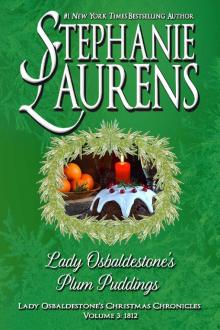 Lady Osbaldestone’s Plum Puddings: Lady Osbaldestone’s Christmas Chronicles Volume 3
Lady Osbaldestone’s Plum Puddings: Lady Osbaldestone’s Christmas Chronicles Volume 3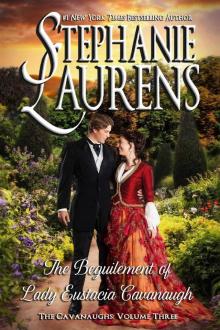 The Beguilement of Lady Eustacia Cavanagh: The Cavanaughs Volume 3
The Beguilement of Lady Eustacia Cavanagh: The Cavanaughs Volume 3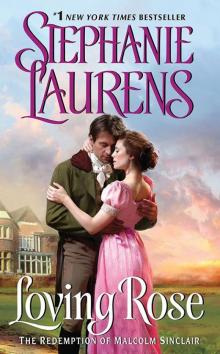 Loving Rose: The Redemption of Malcolm Sinclair (Casebook of Barnaby Adair)
Loving Rose: The Redemption of Malcolm Sinclair (Casebook of Barnaby Adair)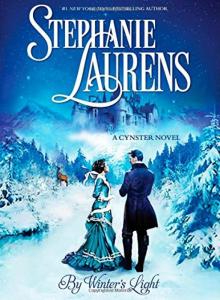 By Winter's Light
By Winter's Light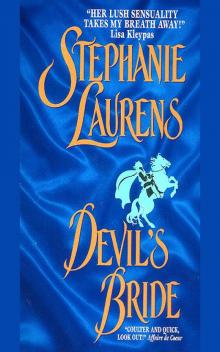 Devil's Bride
Devil's Bride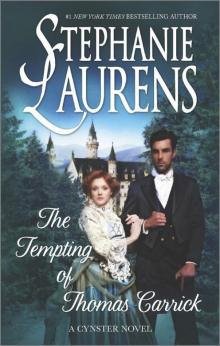 The Tempting of Thomas Carrick
The Tempting of Thomas Carrick![Cynster [22.00] A Match for Marcus Cynster Read online](http://i1.bookreadfree.com/i/03/16/cynster_[22_00]_a_match_for_marcus_cynster_preview.jpg) Cynster [22.00] A Match for Marcus Cynster
Cynster [22.00] A Match for Marcus Cynster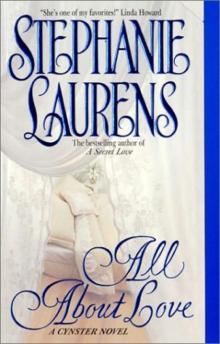 All About Love c-6
All About Love c-6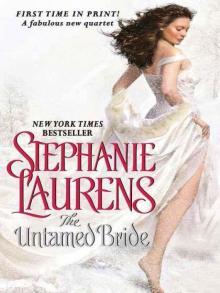 Cobra 01 The Untamed Bride
Cobra 01 The Untamed Bride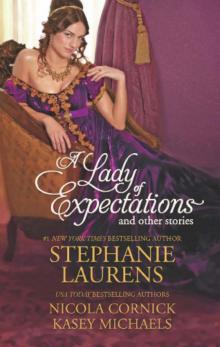 A Lady of Expectations and Other Stories
A Lady of Expectations and Other Stories By Winter's Light_A Cynster Novel
By Winter's Light_A Cynster Novel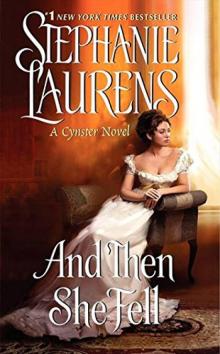 And Then She Fell
And Then She Fell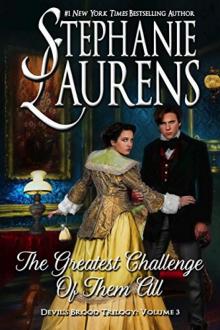 The Greatest Challenge of Them All
The Greatest Challenge of Them All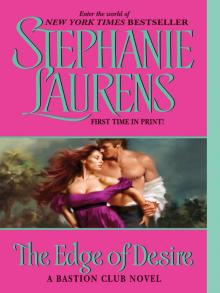 The Edge of Desire
The Edge of Desire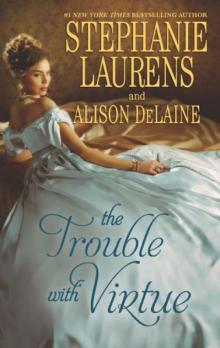 The Trouble With Virtue: A Comfortable WifeA Lady by Day
The Trouble With Virtue: A Comfortable WifeA Lady by Day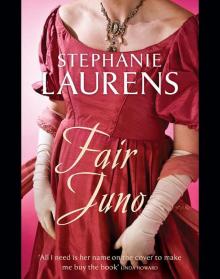 Fair Juno
Fair Juno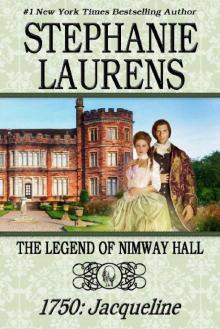 THE LEGEND OF NIMWAY HALL: 1750 - JACQUELINE
THE LEGEND OF NIMWAY HALL: 1750 - JACQUELINE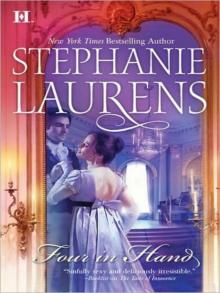 Four In Hand
Four In Hand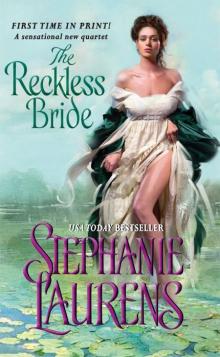 The Reckless Bride
The Reckless Bride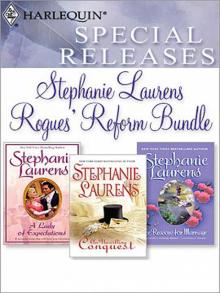 Stephanie Laurens Rogues' Reform Bundle
Stephanie Laurens Rogues' Reform Bundle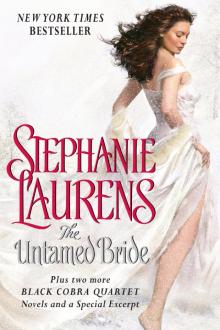 The Untamed Bride Plus Black Cobra 02-03 and Special Excerpt
The Untamed Bride Plus Black Cobra 02-03 and Special Excerpt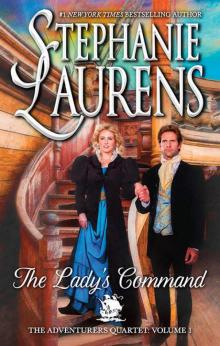 The Lady's Command (Adventurers Quartet #1)
The Lady's Command (Adventurers Quartet #1)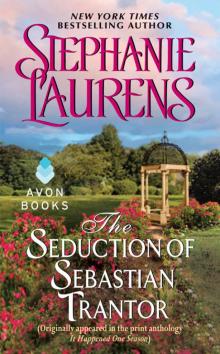 The Seduction of Sebastian Trantor
The Seduction of Sebastian Trantor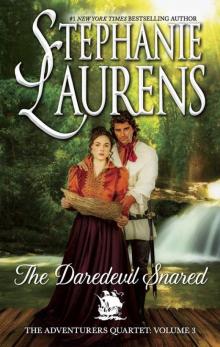 The Daredevil Snared (The Adventurers Quartet Book 3)
The Daredevil Snared (The Adventurers Quartet Book 3)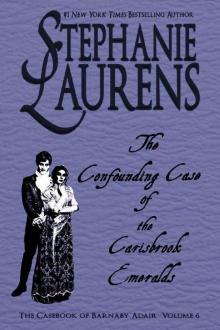 The Confounding Case Of The Carisbrook Emeralds (The Casebook of Barnaby Adair 6)
The Confounding Case Of The Carisbrook Emeralds (The Casebook of Barnaby Adair 6) Lord of the Privateers (The Adventurers Quartet)
Lord of the Privateers (The Adventurers Quartet)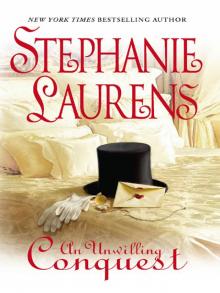 An Unwilling Conquest
An Unwilling Conquest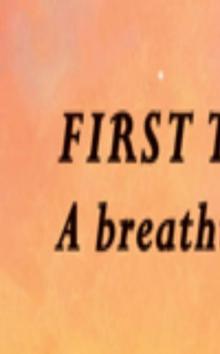 Brazen Bride
Brazen Bride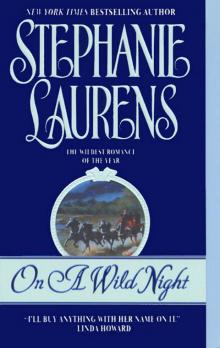 On a Wild Night
On a Wild Night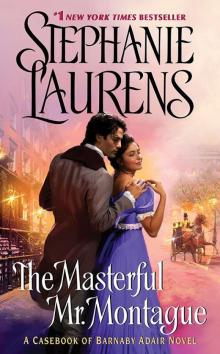 The Masterful Mr. Montague: A Casebook of Barnaby Adair Novel
The Masterful Mr. Montague: A Casebook of Barnaby Adair Novel Lord of the Privateers
Lord of the Privateers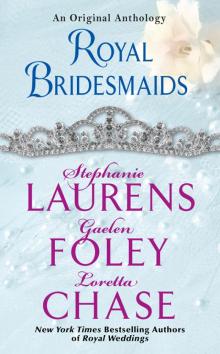 Royal Bridesmaids
Royal Bridesmaids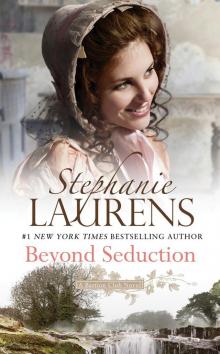 Beyond Seduction
Beyond Seduction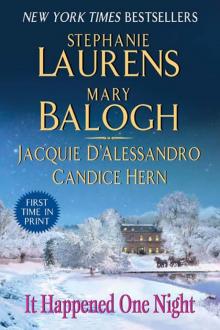 It Happened One Night
It Happened One Night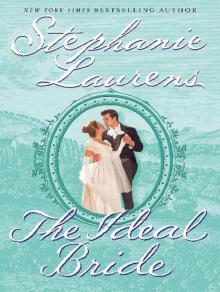 The Ideal Bride
The Ideal Bride The Promise in a Kiss
The Promise in a Kiss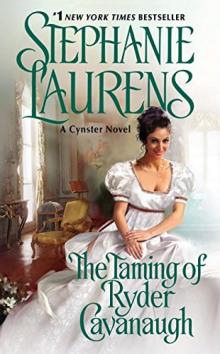 The Taming of Ryder Cavanaugh
The Taming of Ryder Cavanaugh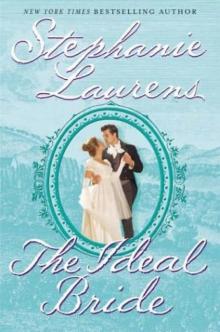 The Ideal Bride c-12
The Ideal Bride c-12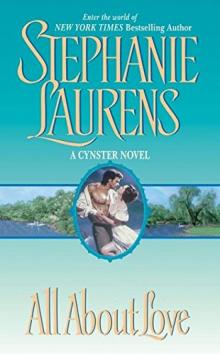 All About Love
All About Love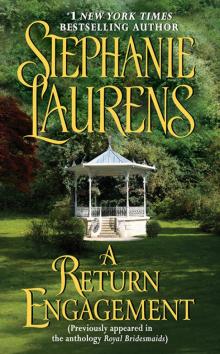 A Return Engagement
A Return Engagement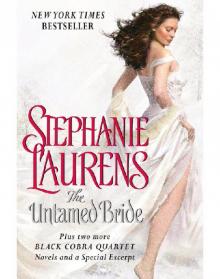 The Untamed Bride Plus Two Full Novels and Bonus Material
The Untamed Bride Plus Two Full Novels and Bonus Material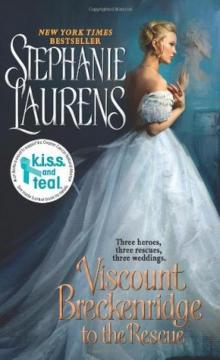 Viscount Breckenridge to the Rescue
Viscount Breckenridge to the Rescue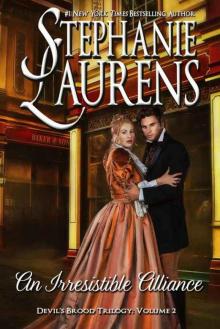 An Irresistible Alliance (Cynsters Next Generation Novels Book 5)
An Irresistible Alliance (Cynsters Next Generation Novels Book 5)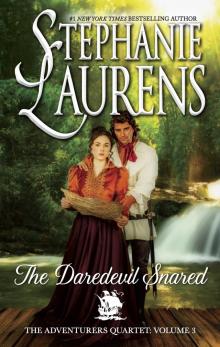 The Daredevil Snared
The Daredevil Snared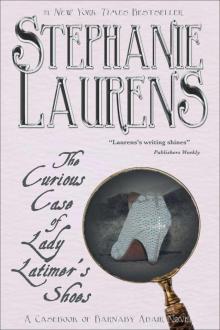 The Curious Case of Lady Latimer's Shoes: A Casebook of Barnaby Adair Novel
The Curious Case of Lady Latimer's Shoes: A Casebook of Barnaby Adair Novel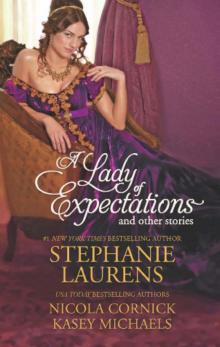 A Lady of Expectations and Other Stories: A Lady of ExpectationsThe Secrets of a CourtesanHow to Woo a Spinster
A Lady of Expectations and Other Stories: A Lady of ExpectationsThe Secrets of a CourtesanHow to Woo a Spinster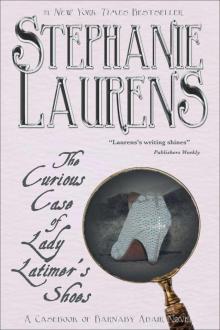 The Curious Case of Lady Latimer's Shoes: A Casebook of Barnaby Adair Novel (The Casebook of Barnaby Adair)
The Curious Case of Lady Latimer's Shoes: A Casebook of Barnaby Adair Novel (The Casebook of Barnaby Adair)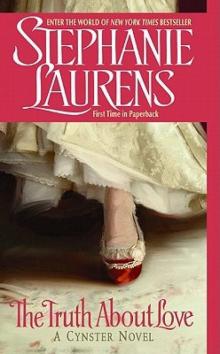 The Truth About Love
The Truth About Love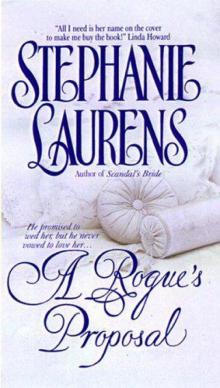 A Rogue's Proposal
A Rogue's Proposal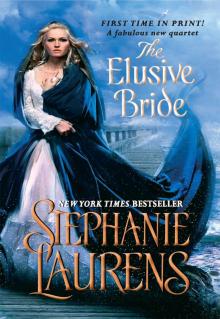 The Elusive Bride
The Elusive Bride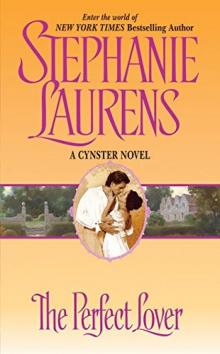 The Perfect Lover
The Perfect Lover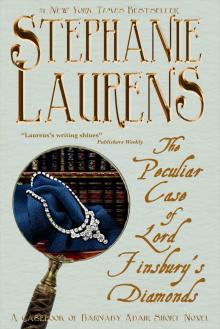 The Peculiar Case of Lord Finsbury's Diamonds: A Casebook of Barnaby Adair Short Novel
The Peculiar Case of Lord Finsbury's Diamonds: A Casebook of Barnaby Adair Short Novel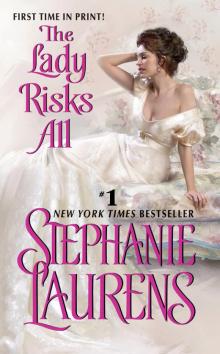 The Lady Risks All
The Lady Risks All The Murder at Mandeville Hall: The Casebook of Barnaby Adair: Volume 7
The Murder at Mandeville Hall: The Casebook of Barnaby Adair: Volume 7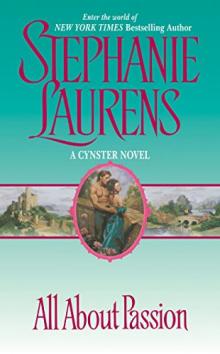 All About Passion
All About Passion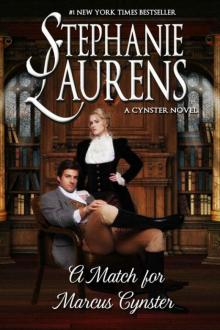 A Match for Marcus Cynster
A Match for Marcus Cynster By Winter's Light: A Cynster Novel (Cynster Special Book 2)
By Winter's Light: A Cynster Novel (Cynster Special Book 2)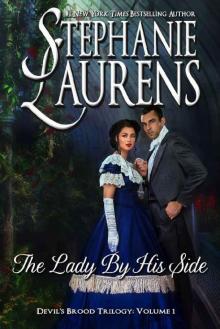 The Lady By His Side
The Lady By His Side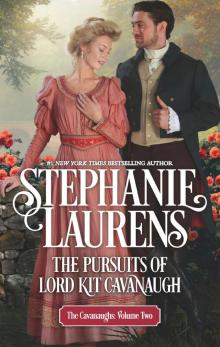 The Pursuits of Lord Kit Cavanaugh
The Pursuits of Lord Kit Cavanaugh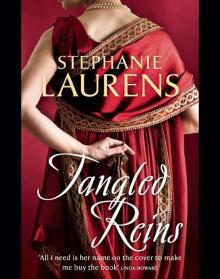 Tangled Reins
Tangled Reins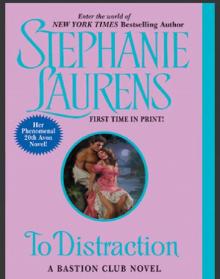 To Distraction
To Distraction A Rake's Vow
A Rake's Vow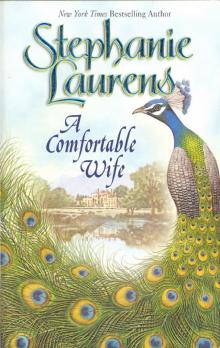 A Comfortable Wife
A Comfortable Wife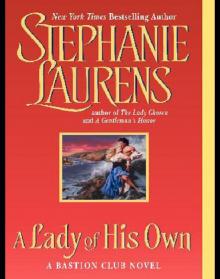 A Lady of His Own bc-3
A Lady of His Own bc-3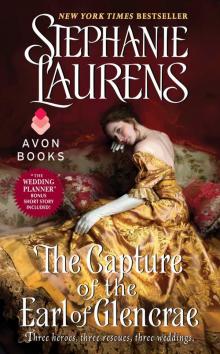 The Capture of the Earl of Glencrae
The Capture of the Earl of Glencrae Scandals Bride c-3
Scandals Bride c-3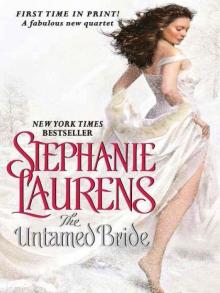 Untamed Bride
Untamed Bride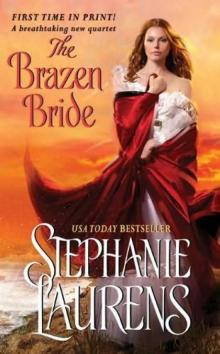 The Brazen Bride
The Brazen Bride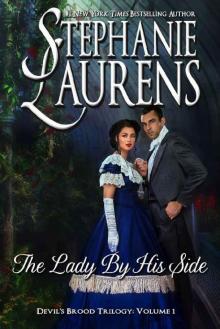 The Lady By His Side (Cynsters Next Generation Novels Book 4)
The Lady By His Side (Cynsters Next Generation Novels Book 4)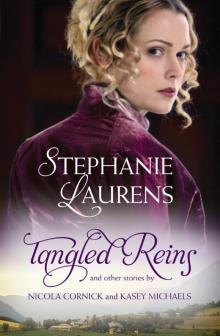 Tangled Reins and Other Stories
Tangled Reins and Other Stories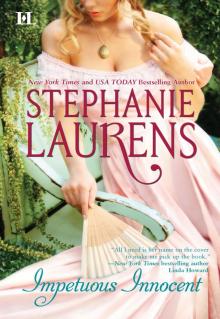 Impetuous Innocent
Impetuous Innocent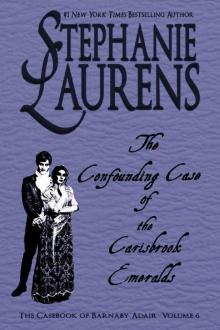 The Confounding Case Of The Carisbrook Emeralds
The Confounding Case Of The Carisbrook Emeralds Stephanie Laurens - B 6 Beyond Seduction
Stephanie Laurens - B 6 Beyond Seduction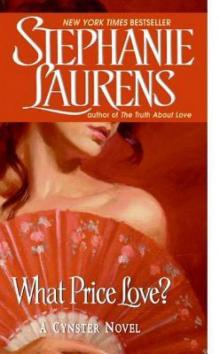 What Price Love?
What Price Love?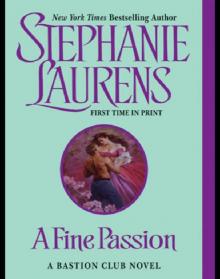 A Fine Passion
A Fine Passion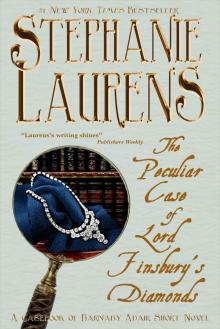 The Peculiar Case of Lord Finsbury's Diamonds: A Casebook of Barnaby Adair Short Novel (The Casebook of Barnaby Adair)
The Peculiar Case of Lord Finsbury's Diamonds: A Casebook of Barnaby Adair Short Novel (The Casebook of Barnaby Adair)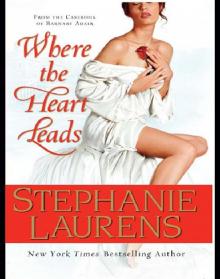 Where the Heart Leads
Where the Heart Leads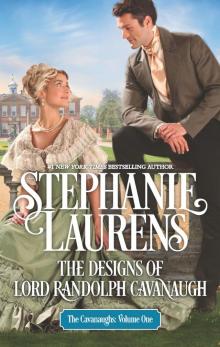 The Designs of Lord Randolph Cavanaugh
The Designs of Lord Randolph Cavanaugh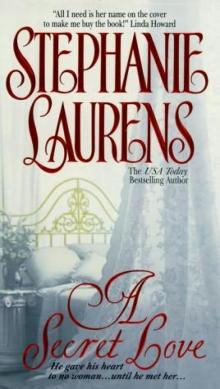 A Secret Love c-5
A Secret Love c-5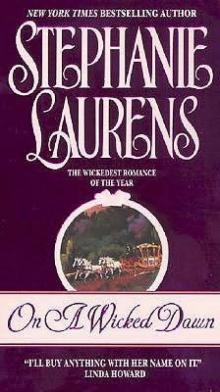 On a Wicked Dawn c-10
On a Wicked Dawn c-10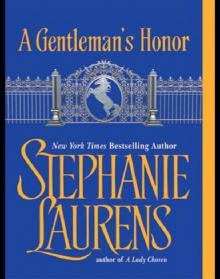 A Gentleman's Honor
A Gentleman's Honor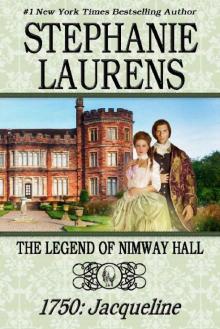 THE LEGEND OF NIMWAY HALL_1750_JACQUELINE
THE LEGEND OF NIMWAY HALL_1750_JACQUELINE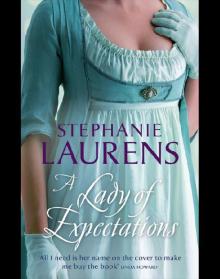 A Lady of Expectations
A Lady of Expectations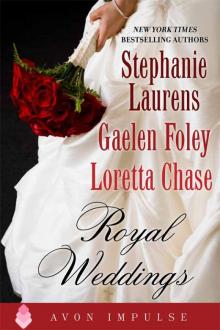 Royal Weddings: An Original Anthology
Royal Weddings: An Original Anthology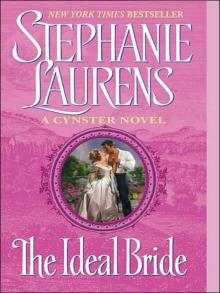 The Ideal Bride (Cynster Novels)
The Ideal Bride (Cynster Novels) Mastered by Love
Mastered by Love A Buccaneer at Heart
A Buccaneer at Heart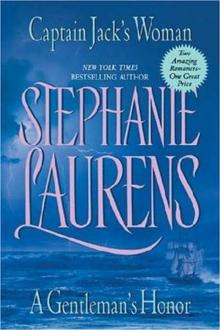 Captain Jack’s Woman / A Gentleman's Honor
Captain Jack’s Woman / A Gentleman's Honor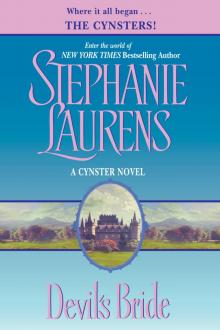 Devil's Bride with Bonus Material
Devil's Bride with Bonus Material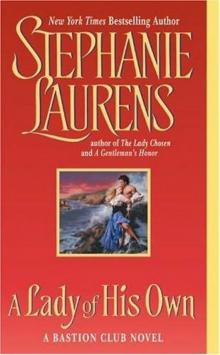 A Lady of His Own
A Lady of His Own A Secret Love
A Secret Love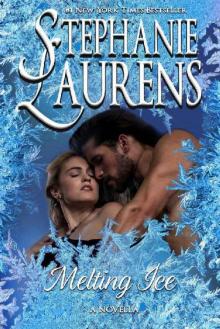 Melting Ice
Melting Ice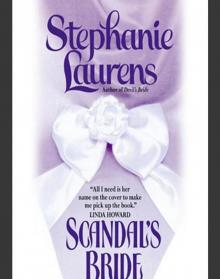 Scandal's Bride
Scandal's Bride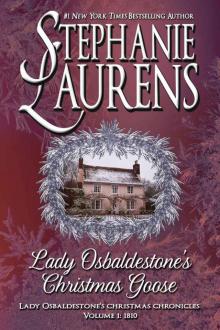 Lady Osbaldestone’s Christmas Goose
Lady Osbaldestone’s Christmas Goose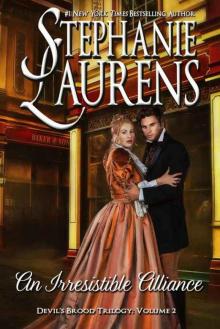 An Irresistible Alliance
An Irresistible Alliance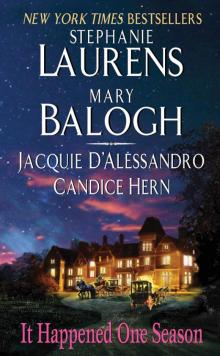 It Happened One Season
It Happened One Season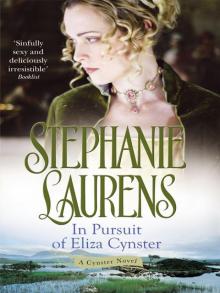 In Pursuit Of Eliza Cynster
In Pursuit Of Eliza Cynster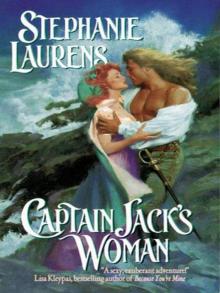 Captain Jack's Woman
Captain Jack's Woman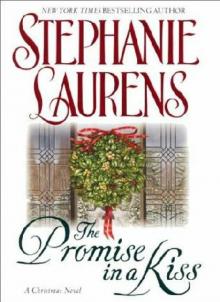 The promise in a kiss c-8
The promise in a kiss c-8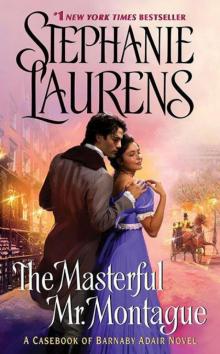 The Masterful Mr. Montague
The Masterful Mr. Montague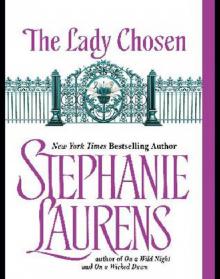 The Lady Chosen
The Lady Chosen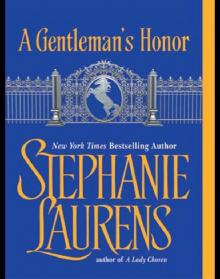 A Gentleman's Honor bc-2
A Gentleman's Honor bc-2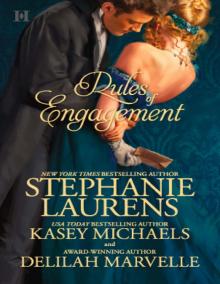 Rules of Engagement: The Reasons for MarriageThe Wedding PartyUnlaced (Lester Family)
Rules of Engagement: The Reasons for MarriageThe Wedding PartyUnlaced (Lester Family) Secrets of a Perfect Night
Secrets of a Perfect Night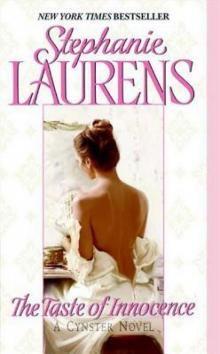 The Taste of Innocence
The Taste of Innocence On A Wicked Dawn
On A Wicked Dawn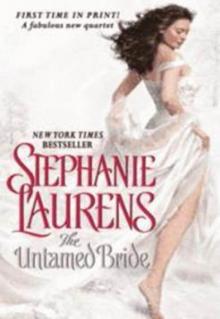 The Untamed Bride
The Untamed Bride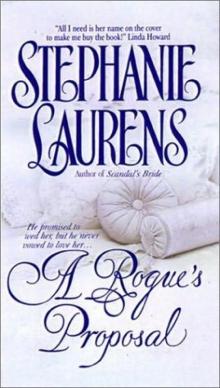 A Rogues Proposal c-4
A Rogues Proposal c-4 Rakes Vow c-2
Rakes Vow c-2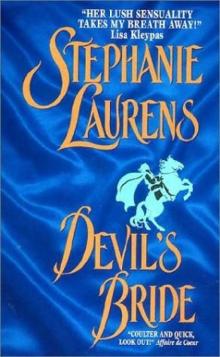 Devils Bride c-1
Devils Bride c-1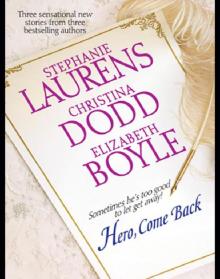 Hero, Come Back
Hero, Come Back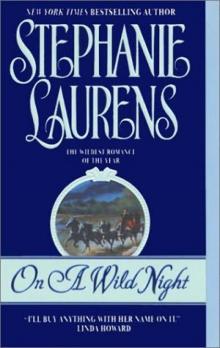 On a Wild Night c-8
On a Wild Night c-8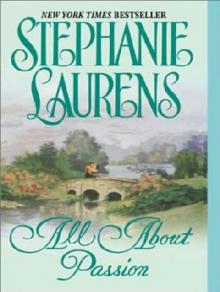 All About Passion c-7
All About Passion c-7